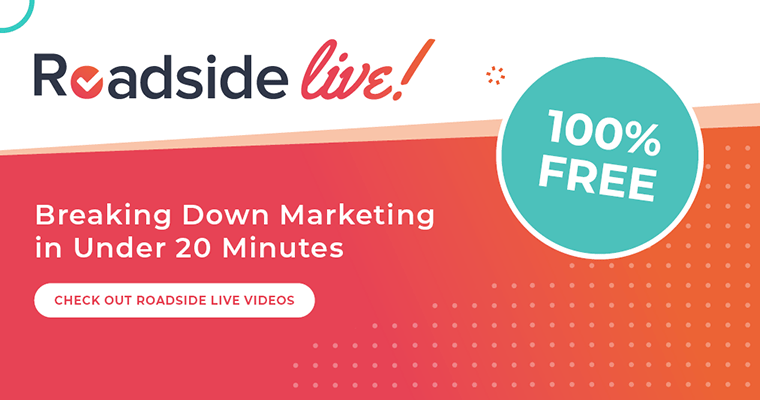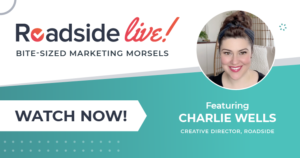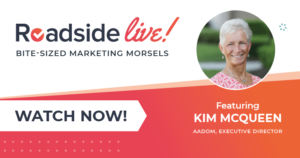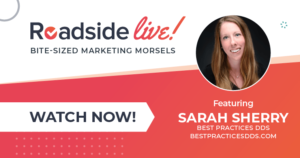Building a Team of Marketing Unicorns [VIDEO]
Building a team that’s patient-focused, marketing-minded, and qualified can be a huge challenge for dental practices. With so much uncertainty in the market right now, finding (and keeping!) rockstar team members is not always easy. But there is a silver lining in this situation: As you aim to fill various roles, you have the opportunity to look for the people we like to call Marketing Unicorns.
What is a Marketing Unicorn, you ask? 🦄✨
These magical creatures bring an impactful, growth-focused, patient-first mindset to their job and provide an outstanding patient experience, no matter what role they fill. They can also have a tremendously positive effect on overall team cohesion and the culture and attitude within the office.
In this 17-minute video, you’ll discover the answers to these questions:
- How do you find qualified candidates that bring a marketing mindset to the role?
- Where are the best places to look?
- How can you “sell yourself” to a candidate you really love?
Angela: Hello everyone. Thank you for joining us for another Facebook live session. Today, we have one of our own Roadside team members, Lori Williams, joining us, and Lori is going to help us talk about how we find that perfect team member. We know that’s been some of the feedback we’ve heard a lot in 2020, with COVID layoffs and then getting people back, they were really struggling to find the right fit for the office. Probably more than ever, that was some of the feedback that we heard on the challenges that dental practices were experiencing: getting the right team in place, getting team cohesion, and finding the right fit for their practice.
Lori, I know you have some experience in interviewing roles before you joined Roadside.
So let’s just talk for a second about the process. How would you coach an office to find the perfect candidate? I know we were calling them the “unicorn” team members, the elusive team members you hope to find – what would you say they could do before they start the hiring process to really decide how they’re going to find that unicorn?
Lori: Yeah, that’s a great question, Angela. Thanks for having me.
So whenever you’re going about the challenge of trying to find the best fit for the office, for different roles, start to map out what it is that you really want in that role even before you post a job online. Really brainstorm what it is that you want this person to be able to do.
What I think works best, especially in the front desk roles, treatment coordinators, things like that – you can teach someone dental, but I think it’s a better, more proactive step to find a marketing-minded individual for those roles. So, start brainstorming that. Start looking at their qualifications and things they’re going to do to help your office succeed in the marketing aspect, in the patient relationships, personality. Those are going to be first and foremost what you’re looking for in that candidate.
So as you start to build the job post, actually build in that language of, “Needs to have a marketing background” or “Needs to be comfortable with social media.” Some of those things are going to be really critical in the actual job posting itself, as it starts to track in those applicant tracking systems, going through the algorithms, finding those resumes that are gonna match.
So brainstorm first and then start to build your job post so that it reads with some marketing language, patient relations, not just dental verbiage, and that’s going to help get to a broader net of candidates so that you cast that net wide and you get a good return on who you’re looking for as a candidate.
Build your job post to include marketing language, not just dental verbiage, to find a broader net of candidates and get a good return on who you’re looking for.
Angela: Yeah, those are great ideas. I think for the clinical roles, it’s a little more straightforward as to the skills you need. For a hygienist, you’d need to have this certification, or for the back office, you’d need to have this skillset. But even I think for those roles, if you do have an influx of many candidates, it’s nice to sort through them based on who’s going to help your practice grow. So even within the clinical roles, it’s probably a good idea to add some of those elements to decide what your practice is going to look like, what skills you need, or what help you might need.
So once they define who they need, what are some places that they can look for them?
I think that’s one of the things I hear offices struggle with. With the exception of going to an agency that sends people, how else would they find a good candidate? Where are they hiding?
Lori: Absolutely. And that’s the big hurdle, right? Where do we find these people?
And you touched on a good point there as well – even though it’s a clinical position, there are lots of dental hygienists and assistants that do have a marketing background as well, or they’re familiar with social media. So yes, don’t just kind of narrow it in that position as well.
But to answer your question, there are multiple places you can look.
So first and foremost, I would say, start reaching out to your patients, to your target audience.
You’d be surprised how many people are actually looking for a job who have those skills that you might already have a relationship with, so, it’s a good idea to post on your business Facebook page that you’re looking for someone. I have personal experience with that. I was a patient of the doctor that I went to, and then I started working for him. That happened to me twice, actually. And it was simply because they announced that they were looking, and I had made that information known as well. So cast the net wide, ask who you know, who’s looking for a job, look in your community groups, networking groups. Referrals are always best.
Cast the net wide: Reach out to patients, ask who’s looking for a job, look in your networking groups. Referrals are always best.
Get the word out first and foremost that this is what you need, this is what you’re looking for. And in other places, be proactive, not just reactive. Don’t just put a job posting out there on Indeed and wait for the leads to come to you. You need to actually go out there and start searching out the candidates.
Platforms like LinkedIn will allow you to do that. Obviously, on Indeed you can go out there and do a proactive search as well. Glassdoor is another good one that you can search. Don’t rule out the Facebook groups, all of that. There are going to be people that are actively looking for jobs and you can search the hashtags #jobneeded or #marketing. Start to put in the different parameters that you’re looking for, and these people will start to show up in your feed.
So those would just be some quick tips I would suggest – and – don’t rule out an agency. If you need help with that, they obviously come into contact with a lot of candidates, and they know who’s looking. So just add it to your arsenal of different places you’re looking at. And don’t just narrow it to one platform.
Angela: Yeah, that’s a good idea. I think some of those for the medical-dental world, sometimes they get kind of stuck in their boxes to where they can look. And so reaching out on different platforms, because like you mentioned, there are people with the clinical skills that are on different platforms looking, so those are good reminders.
So once the candidates start rolling in, how do you go through the interview process? How do you wade through candidates, make it the most productive? Because I mean, it’s actually a good problem if you have too many candidates. For clinical, we hear right now that’s not the case so much, but for front office positions, there can sometimes be more candidates than they even know how to wade through.
So what are your tips for that?
Lori: Yeah, so it’s a good problem to have when that starts happening, but it can be a real challenge on the backend for the people who are making those decisions.
So I always recommend, go through the resume, and then you want to start looking for certain things that could be red flags: Major job gaps, things like short tenures without an explanation of why they left that role. Sometimes things do happen and layoffs have happened. Be cognizant of that as you’re going through the resumes, that if you do see a short tenure, but they’ve had a really good work history, don’t just rule that out because it could have been that they went through a layoff and it’s to no fault of their own, especially in 2020. That’s going to be common. So keep that in mind, as you are sifting through resumes, don’t rule those people out because it’s probably not their fault.
Definitely look at their skills section. Do they have translatable skills? So, do they have the skills that maybe they did this in another job? It’s not specific to that industry, but it could be used for your dental practice. Were they good at multitasking? Are they good at client relations?
I’ve seen people in real estate, where they have transferred over into the dental world because there are a lot of transferable skills in those two industries – working at a fast pace, multitasking, and having to do high-level client relations, those types of things.
Even if they’re not from your industry, do they have translatable skills that could be used for your dental practice? Were they good at multitasking? Are they good at client relationships?
Don’t just keep that narrow focus of, “have they worked in a dental office?” Broaden it out just a little bit and see, have they done things that would be translatable to your practice and help your practice grow? As you’re weeding through the resumes, keep those things in mind, just so that way you have a better understanding of what their background could bring to you.
Angela: Right. And I think that’s a good reminder also for the positions that you’re hiring for, is that sometimes, for example, if you’re hiring someone for patient coordination or for treatment planning, having someone who has some sales experience can actually be a really good fit, because they may already have some of the skills on how to reach people, how to connect with people, how to sell the benefits of the treatment, and you just have to teach them the dental version, the dental side.
So I think a lot of times offices get stuck in, “do they have dental experience?” but especially for those more administrative positions, broadening that a little bit would be really good.
If you’re hiring for patient coordination or treatment planning, having someone with sales experience can be a really good fit – they already have the skills to reach people, to connect with people, to sell the benefits of the treatment.
What about finding the right fit for personality and for team cohesion?
Again, we heard so much in 2020 that that has been their biggest challenge: Coming back to a team that, let’s just say, was rockier than it was before. And the new personalities didn’t all jive. I know it takes a while for new teams to start really being a unit, but how do you find the right person for that unit?
Lori: Yeah. Such an important concept to be thinking about whenever you’re bringing in a new person because dental offices are unique in that it’s like family. It’s a very family atmosphere. You get very close with your staff. It’s just the nature of that business, it tends to lend itself to that. So you don’t want to bring someone in that may not be a good culture fit or personality fit.
I like personality tests to kind of get to some of that early on, but I don’t like to hold just to those because some people aren’t good test-takers. I think a good way to really implement and figure out, “Is this the right person for our office?” is to do a working interview.
Once you’ve narrowed it down to two or three candidates, then do a working interview. Bring them into the office, see how they are in more of a natural state, where it’s not a high-pressure interview where their nerves are running high.
Bring them in and let them see your practice: Let them see the team, how the patient flow is, what the schedule is like. Can they keep up with that volume? Does it intimidate them? You want to know these things upfront. And I think it’s for both parties, the person being interviewed, they want to know, “Is this the right fit for me? Is this an office I can align with, and want to grow with?” So it’s just a good thing for both parties to be able to see it in action, so I highly recommend that.
Angela: Yeah, I was actually gonna kind of piggyback on that and say, playing the devil’s advocate on the hiree’s side, I think that is really important.
I know that being in the dental industry for, let’s just say over 20 years, I did my share of time in the actual real-world practices. And I, at this point in my career, even several years into it, I would never have accepted a job where I didn’t do a working interview because you want to see the real-life atmosphere. There are things that you just can’t see on paper, that you just can’t get a good vibe for on the interview. So for both parties, I think those working interviews are super important.
So in addition to a working interview, what else do you think the dental team themselves could bring to the table for this interview process to really make the candidate choose them?
You know, it might be that if they do have the clinical skillset, they may get to be pretty choosy as to what office they want to go to, because there is right now a little bit of a need more than before in the dental industry. So what can an office do to kind of “sell themselves” to the right candidate?
Lori: Yeah. And that’s such a good point because this conversation is as much for the person looking for a job as it is for the person hiring. Because if it’s not a mutual fit, it’s not going to work for either one of you, you know?
I always say, if you’re trying to wow the candidates, say you’ve found someone in the office and you really, really like them, then how are you going to sell yourself to that candidate?
There’s a couple of different things I think you can do. Definitely be open with them, let them know about some of the cool things that your office does. I mean, are you involved in the community? Do you do different fun workdays where you dress up? I know different offices do that. Do you have certain perks? Are you closed during the winter holidays at the end of December? Different things like that can be very attractive. Closed on Fridays, you know, stuff like that. That might be more of an interest to them, so let them know this! Let them know during the interview process, really, even before the working interview.
Let them know about perks: Are you involved in the community? Are you closed during the winter holidays at the end of December? Closed on Fridays? Do you offer incentives for production goals? Different things like that can be very attractive.
I know when I was back in the dental world we used to take an annual trip if we hit bonuses. So I got to go to Disney World and Maui and other places because that was what he had set up as the incentive. So selling that to me during the interview was, you know, a no-brainer. So yeah, there’s “Office A” over here that doesn’t do that, and “Office B” is going to take you to Maui if you work hard. You know, no thought needed!
Angela: Two trips to Hawaii and one trip to Vegas – that sold me on hitting production bonuses for the year!
Lori: Exactly. Exactly. It’s like, “Oh, okay. How late do I have to work every day? Sure!” There’s more of a willingness, that attitude to respond when there are things like that on the line and it just builds team cohesion.
Definitely have your team members be involved in that process as well. Even though they’re not the decision-makers, they do have valuable input, so get their feedback as well.
Have them meet these candidates and share their experience and what they love about the job and what makes it unique and why they chose this practice over another one. There are all sorts of things like that, that you can try to sell the candidate on so that they choose you as they’re doing their interviewing.
Have your team members be involved in the process as well. Even though they’re not the decision-makers, they do have valuable input, so get their feedback.
Angela: Right. And I know this could be a topic that could be a completely different live session, and it may become one, but once we’ve hired them, what are some tips you’d give to employers, to practices, to retain the dream team? You have a team member that is really valuable to you – what are some things that you can do to keep yourself valuable to them?
Lori: Well, so let’s take last year, for example. So in 2020, layoffs were happening, patients stopped coming in, offices had to close. So at that point, I think people got nervous. And how can you best retain those workers? So doing a lot of cross-training during that time when times are slow I think is really good to have.
So maybe your treatment coordinator or your front desk team is really great at social media, then during slow times, they can train hygienists and dental assistants on some of those different avenues where you can get online, keep yourself in front of the patients, post some Facebook stories, different things like that, make them part of the process so that they’re more valuable to the team.
They start to broaden their skillset. Therefore you want to keep them, retain them, and they become an asset to the office. It’s all about that team mentality, keeping everybody engaged, keeping the lines of communication open and being honest with them, and letting them know their worth and that they’re important to your practice.
It’s all about that team mentality, keeping everybody engaged, keeping the lines of communication open, and letting them know their worth and that they’re important to your practice.
And I think all of that continues that collaborative effort; even in really hard times, you want to stick together as a team.
Angela: Right. And I know that we are very hopeful that there won’t be additional closures in 2021, but I think everyone is very aware that we don’t know what the overall economy will do and what practices are going to look like in this next year. There might still be a lot of adaptability necessary. There might be some changes to the way practices function. There could be some changes to scheduling. There could be a lot of required, necessary adjustments to our status quo and normal.
Keeping that in mind and, like you said, the team environment is so important, getting everyone on the same page so they are working together to accomplish the goals of the practice and there are no silos, that people don’t feel divided between the back and the front, but really keeping them unified is going to help really ride out whatever storm we might still be having ahead of us.
We all hoped that there was going to be a magic, easy button when the calendar turned, but it’s not looking that way quite yet. We still might be a few more months of a little bit of crazy time. So I think those are great tips for everyone.
Thank you so much for joining us today. And we may be doing another one in a couple of weeks just on team building and cohesion and how to keep the team strong. So we’ll be talking with you soon!




